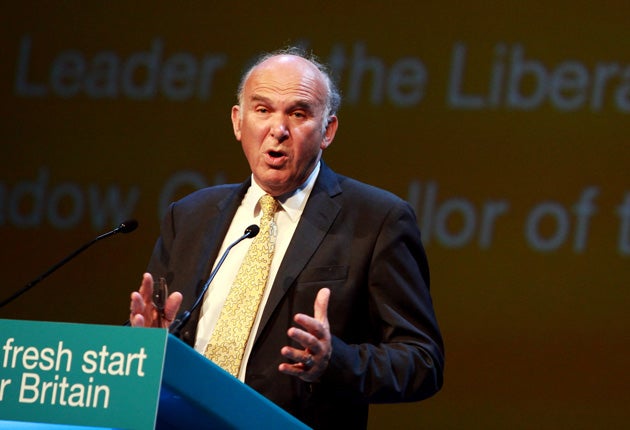Steady on, says Cable, as big home tax unravels
Lib Dem leaders face accusations of launching half-finished proposals

A Liberal Democrat plan to hit the rich with a new tax on million-pound mansions began to unravel yesterday after it emerged that the plan would only be temporary, may not be applied across Britain and could hit some pensioners on low incomes.
The measure, revealed by The Independent, was a main plank of the keynote speech made yesterday by Vince Cable, the party's Treasury spokesman, to the Liberal Democrat conference in Bournemouth. He said that the new levy was designed to hit the likes of the Chelsea Football Club owner, Roman Abramovich, and the London-based steel magnate Lakshmi Mittal. "Under our unfair council tax, Messrs Mittal and Abramovich, in their £30m palaces, pay the same as a band H family home, though their properties may be worth 40 or 50 times as much," he said.
Introducing the levy would, the Liberal Democrats say, allow the Government to take four million low earners out of income tax altogether by raising the threshold for the tax to £10,000. About 250,000 homes would be affected by the 0.5 per cent levy on houses costing more than £1m. The average yield would be about £4,000, the party said.
But the plans began to unravel on the day. Senior party figures had to admit that the measure would only be temporary while plans for a local income tax were tested. Aides would only say that the levy would last for "several years".
It also emerged that the party would be unlikely to implement the policy in Scotland. Under devolved powers, the new tax would need to be approved by Holyrood. Mr Cable conceded that Liberal Democrats in Scotland would have to "make the case" for the policy. "It would have to be approved by the Scottish Parliament," he said. "That is a choice for Scotland."
There were also suspicions that the measure would become a new inheritance tax by stealth, as Mr Cable admitted that those on a small income liable to pay the tax, such as pensioners in larger houses, could have the payment deducted from the value of their estate. "These problems already exist under the current system," he said. "We are not inventing a new problem." Despite the questions, aides insisted that Mr Cable had discussed the policy with frontbench colleagues before it was announced.
The Liberal Democrats immediately faced accusations of launching a half-finished tax plan. Paul Smith, chief executive of Haart estate agents, said the new tax would be unworkable. "This level of taxation is absurd and will only lead to disagreements about values," he said.
Sarah McCarthy-Fry, Exchequer Secretary to the Treasury, accused Mr Cable of performing a U-turn. "They've spent years arguing to replace council tax with more income tax because they don't believe in taxation being linked to homes," she said. "Now they've managed to make the centrepiece of their conference exactly the opposite."
In his speech to delegates, Mr Cable said the Government had been "living beyond its means". He said both Labour and the Tories wanted to go back to "business as usual" in the City, and criticised the Prime Minster for failing to take on the financial sector. He pledged that the Liberal Democrats would force anyone who earned more than the Prime Minister to disclose full details of their pay, bonuses and perks.
He said he could not rule out further tax increases. "It would be dishonest and unbelievable for me to say that taxes overall should never rise," he said. "But the Liberal Democrats' starting position is to aim for fairer not higher taxes." He also had a tough message for public sector workers, arguing that their wages should be frozen as part of the cost cutting drive, saving £2.4bn a year.
Shaky foundations Lib Dems' 'mansion tax'
What are the plans? An annual 0.5 per cent tax on homes worth over £1m.
What went wrong? The Lib Dems admitted yesterday that it would only be put in place temporarily and might prove impossible to introduce in Scotland – the levy would need approval from the Scottish Parliament.
Is the policy regressive? As it taxes property, rather than income, it can be. While a pensioner's house may have accrued a lot of value over time, they may be on a low income.
So what about those pensioners? Those on council tax benefit will be spared the levy. Others would have it deducted from the value of their estate when they die, like an inheritance tax.
Join our commenting forum
Join thought-provoking conversations, follow other Independent readers and see their replies
Comments
Bookmark popover
Removed from bookmarks